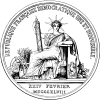Édouard Drouyn de Lhuys: Difference between revisions
No edit summary |
No edit summary |
||
| Line 47: | Line 47: | ||
[[Category:Members of the 1848 Constituent Assembly]] |
[[Category:Members of the 1848 Constituent Assembly]] |
||
[[Category:Members of the National Legislative Assembly of the French Second Republic]] |
[[Category:Members of the National Legislative Assembly of the French Second Republic]] |
||
[[Category:French Senators of the Second Empire]] |
|||
[[Category:Ambassadors of France to the United Kingdom]] |
[[Category:Ambassadors of France to the United Kingdom]] |
||
[[Category:19th-century French diplomats]] |
[[Category:19th-century French diplomats]] |
||
Revision as of 12:45, 7 July 2018


Edouard Drouyn de Lhuys (pronounced [edwaːʁ dʁuɛ̃ də‿lɥis]; 19 November 1805 – 1 March 1881) was a French statesman and diplomat, born at Melun in the department of Seine et Marne. He was educated at the Lycée Louis-le-Grand. The scion of a wealthy and noble house, he excelled in rhetoric. He quickly became interested in politics and diplomacy.
He was ambassador at The Hague and Madrid, and distinguished himself by his opposition to Guizot. Drouyn de Lhuys served as Minister of Foreign Affairs from 1848 to 1849 in the first government of Odilon Barrot. In Barrot's second government, he was replaced by Alexis de Tocqueville, and was appointed ambassador to London. He returned briefly as foreign minister for a few days in January 1851, and then returned permanently in the summer of 1852, becoming the first foreign minister of the Second Empire. He resigned his post in 1855, during the Crimean War, when the peace preliminaries he had agreed to in consultation with the British and Austrians at Vienna were rejected by Napoleon III.
Édouard Drouyn de Lhuys returned to power 7 years later, in 1862, when foreign minister Édouard Thouvenel resigned over differences with Napoleon on Italian affairs. Drouyn was thus foreign minister in the lead-up to the Austro-Prussian War. In the aftermath of that war, which was seen as disastrous to French interests in Europe, Drouyn resigned. He withdrew into private life after the collapse at Sedan in 1870.
Honours
- 1854: Knight Grand Cross in the Order of Leopold.[1]
References
- ^ Handelsblad (Het) 25-12-1854
- Obituary. Edouard Drouyn-de-Lhuys. New York Times, 3 March 1881. Accessed 7 October 2008
- The Illustrated London News, May 19, 1855.
See also
This article incorporates text from a publication now in the public domain: Wood, James, ed. (1907). The Nuttall Encyclopædia. London and New York: Frederick Warne. {{cite encyclopedia}}: Missing or empty |title= (help)
- 1805 births
- 1881 deaths
- Politicians from Paris
- Party of Order politicians
- Bonapartists
- French Foreign Ministers
- Members of the 6th Chamber of Deputies of the July Monarchy
- Members of the 7th Chamber of Deputies of the July Monarchy
- Members of the 1848 Constituent Assembly
- Members of the National Legislative Assembly of the French Second Republic
- French Senators of the Second Empire
- Ambassadors of France to the United Kingdom
- 19th-century French diplomats
- French people of the Crimean War
- French diplomat stubs




